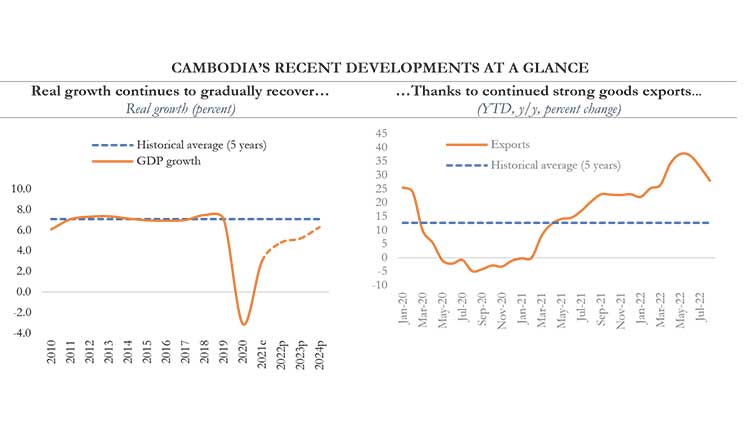Cambodia’s economic recovery on track after Covid jolt: World Bank
Cambodia’s economy seems to be going strong on the recovery path after the Covid-19 pandemic that roiled the world’s economy, according to a World Bank report released on Wednesday.
However, global economic headwinds, like slowing world trade growth, are likely to pose risks to a positive outlook in the coming months, adds the World Bank’s Cambodia Economic Update for December titled “Navigating Global Economic Headwinds”.
The Kingdom, says the World Bank, is forecast to report 4.8 percent economic growth this year and 5.2 percent the next year as the post-Covid-19 pandemic economic recovery continues due to a strong rebound in the travel and tourism sector.
Looking farther into the future says the global lender, Cambodia’s economy is expected to advance to a growth rate of around 6 percent, as international and domestic tourism adds strength.
Remarking that Cambodia’s garment industry, travel goods and footwear exports have been resilient, the World Bank says, “The services sector, especially travel and tourism, has done well since the introduction of the ‘Living with Covid-19’ strategy in late 2021.”
The tourism sector continues to grow strongly. It is also evident from the World Bank report that cites the January-September 2022 data on 1.2 million international tourist arrivals to say “steady increase” inbound visitors.
According to the latest data released on last Wednesday by the Tourism Ministry, Cambodia attracted more than 1.57 million international visitors in January-October of 2022. It shows an increase of 0.37 million tourists in one month and that the 2 million foreign visitor arrival target is within reach.
Economic growth is projected to accelerate to 5.2 percent in 2023 as increased hiring supports rising domestic consumption and as inflation recedes, says the World Bank and adds the prospects for faster growth face serious risks due to developments beyond Cambodia’s borders.
Cambodia has a small economy that is open to outside trade and investment, and the global growth outlook is gloomy. Global trade growth slowed in the second half of 2022 and is projected to slow sharply in 2023, says the World Bank.
“The economies of developing countries such as Cambodia are particularly vulnerable to rising inflation, slower global economic growth, decreased availability of energy supplies, and higher interest rates,” it says.
Cambodia’s manufacturing sector depends on export markets to thrive and would be negatively affected by an extended growth slowdown in its two largest export markets, the United States and the European Union. Similarly, investment and capital inflows would likely diminish as a result of a sustained slowdown in its largest source of foreign direct investment, China.
To ensure sustainability, Cambodia must regain fiscal space. To this end, the World Bank recommends: Broadening the tax base, safeguarding financial stability, promoting domestic economic sectors, particularly in travel, tourism, and hospitality, and addressing the supply chain constraints, which include high logistics and transportation costs, as well as easing supply-side bottlenecks by reducing the costs of energy, doing business and licensing. This would help export businesses revive external competitiveness.
Speaking at the launch of the report, Mariam Sherman, World Bank country director for Cambodia, Myanmar and Lao People’s Democratic Republic, said, “To shield its economy from a possible drop in external demand, Cambodia could take steps to strengthen its fiscal position and promote its domestic economy, particularly its globally attractive tourism industry.”
“Revenues are up, thanks to the economic recovery and administration improvements,” Sherman said.
“Broadening the tax base will help ensure the resources needed to promote Cambodia’s economy and weather slowing growth among major trading partners. Tourism and hospitality are particularly promising areas for growth,” the World Bank official said.
Participation in recently concluded trade agreements can boost agriculture and agro-processing industries.
A special focus section in the Cambodia Economic Update also takes a look at the impact of inflation on poverty. It highlights the need to protect the most vulnerable people with an expansion of carefully targeted temporary social protection programmes.
“Inflation is rising in Cambodia, as elsewhere, and is particularly harmful to poor households, some of whom are forced to reduce food consumption and withdraw children from school. This could have long-term effects on human capital, causing losses in worker productivity and welfare, and disparities in income,” said the report.
The Cambodia Economic Update, prepared by Sodeth Ly and Wendy Karamba with cooperation and support from the Cambodian authorities, particularly the Ministry of Economy and Finance and the National Bank of Cambodia, is focused on short- and medium-term macroeconomic developments and is published twice a year.
Source: https://www.khmertimeskh.com/501198604/cambodias-economic-recovery-on-track-after-covid-jolt-world-bank/


 Thailand
Thailand




